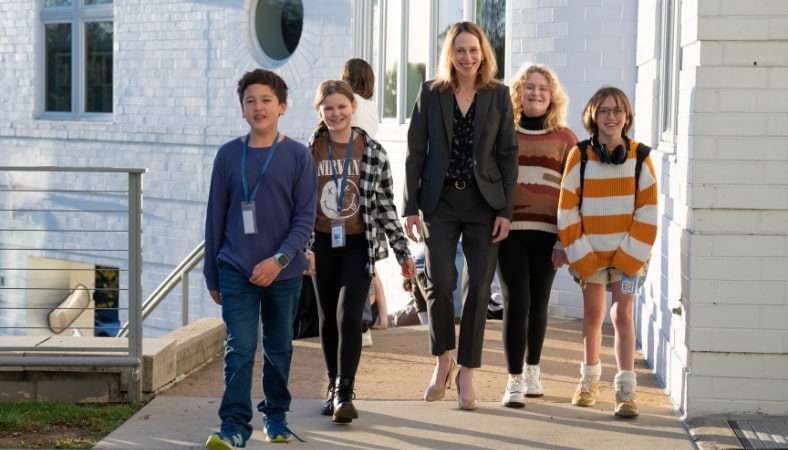
By Lori Strauss, Head of School
Head of School Lori Strauss shares her thoughts on how practicing gratitude is a skill that helps us engage the world with more hope.
Dear Friends,
A recent tradition at Field is our Gratitude Gathering prior to Thanksgiving. This is a time when all of our students and faculty gather to celebrate and acknowledge our connections, appreciations, and the shared values of our community.
Talking to students and families, I know that many are carrying fear, anxiety, and stress about our world. To truly and authentically embrace and articulate gratitude, we also must honor our worries: The Israel-Hamas war, the rise of antisemitism and Islamophobia in our country, an ever-worsening climate crisis, the slow and ever-present build up to an election that is shaping up to be a reboot of 2020, and an overriding fear of an unknown future. This list does not include the personal worries of individual students, families, and faculty about finances, the health of loved ones, broken relationships, or other concerns.
Our practice of gratitude is not intended to negate these worries, but rather provide a balancing point. Gratitude in difficult times is a positive and very healthy coping mechanism. Gratitude allows us to hold two different or even opposing emotions and realities as true.
Practicing gratitude is a skill that helps us engage the world with more hope. It also helps us see the world from another perspective. That ability to shift perspectives and see an issue or problem from a new vantage point is critical to our times.
Our society is experiencing personal polarization, political polarization, and cultural polarization. Too often we are called to choose a side and seek out only like-minded individuals who advance our way of thinking. The ability to even consider an alternate narrative or set of data feels threatening so we tend to avoid it.
Talking with students, I have observed that they feel compelled to participate in this polarization on social media sometimes without strongly developed views, evidence-based opinions, or even feeling truly outraged. Instead, they worry about what others will think or say about them if they don’t engage in largely performative ways, copying memes or reposting quotes to their own stories and accounts on various platforms. This creates an echo chamber of thought that is absent of meaningful dialogue or facts.
At Field, we actively teach and practice gratitude, not as another performative gesture, but truly as a way to interact with our world and shift the conversation. If we can teach through gratitude that expressing authentic appreciation for, and openness to other people, their experiences, and opinions then we begin to truly engage as a healthy community that makes room for, purposefully seeks, and values diversity of thought.
If it was easy to hold space and listen deeply to others we would all just do it. What is abundantly clear to me is that it is necessary for all of us to dig in and learn. For me, learning often comes through reading. The following passage from How to Know a Person: The Art of Seeing Others Deeply and Being Deeply Seen by David Brooks was instructive:
“As soon as somebody starts talking about times when they felt excluded, betrayed or wronged, stop and listen. When somebody is talking to you about pains in their life, even in those cases when you feel their pain is performative or exaggerated, it’s best not to try to yank the conversation back to your frame. Your first job is to stay within the other person’s standpoint to more fully understand how the world looks to them. Your next job is to encourage them to go into more depth about what they have just said. ‘I want to understand your point of view as much as possible. What am I missing here?’ Curiosity is the ability to explore something even in stressful and difficult circumstances.” (pg.115)
I have chosen this book for our next book club meeting because it is pushing my practice of gratitude for this community to include seeing people deeply which I hope will make me a more curious listener, more generous collaborator, and more reflective colleague. I hope you will read along with me and join me on February 1 at 8:30am for our discussion.
I continue to be grateful for the talented and committed faculty who arrive every morning ready to embrace our students and our complicated world. I am grateful for their determination to challenge our students and each other to grow and evolve as human beings.
I am also grateful to our parents and students for nurturing a community that has a deep desire to continue to deepen our understanding of each other and learn together.
Wishing you and yours a rejuvenating Thanksgiving break.
Warmly,
Lori
